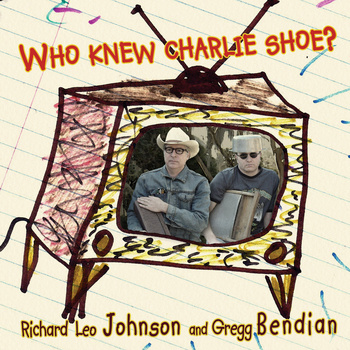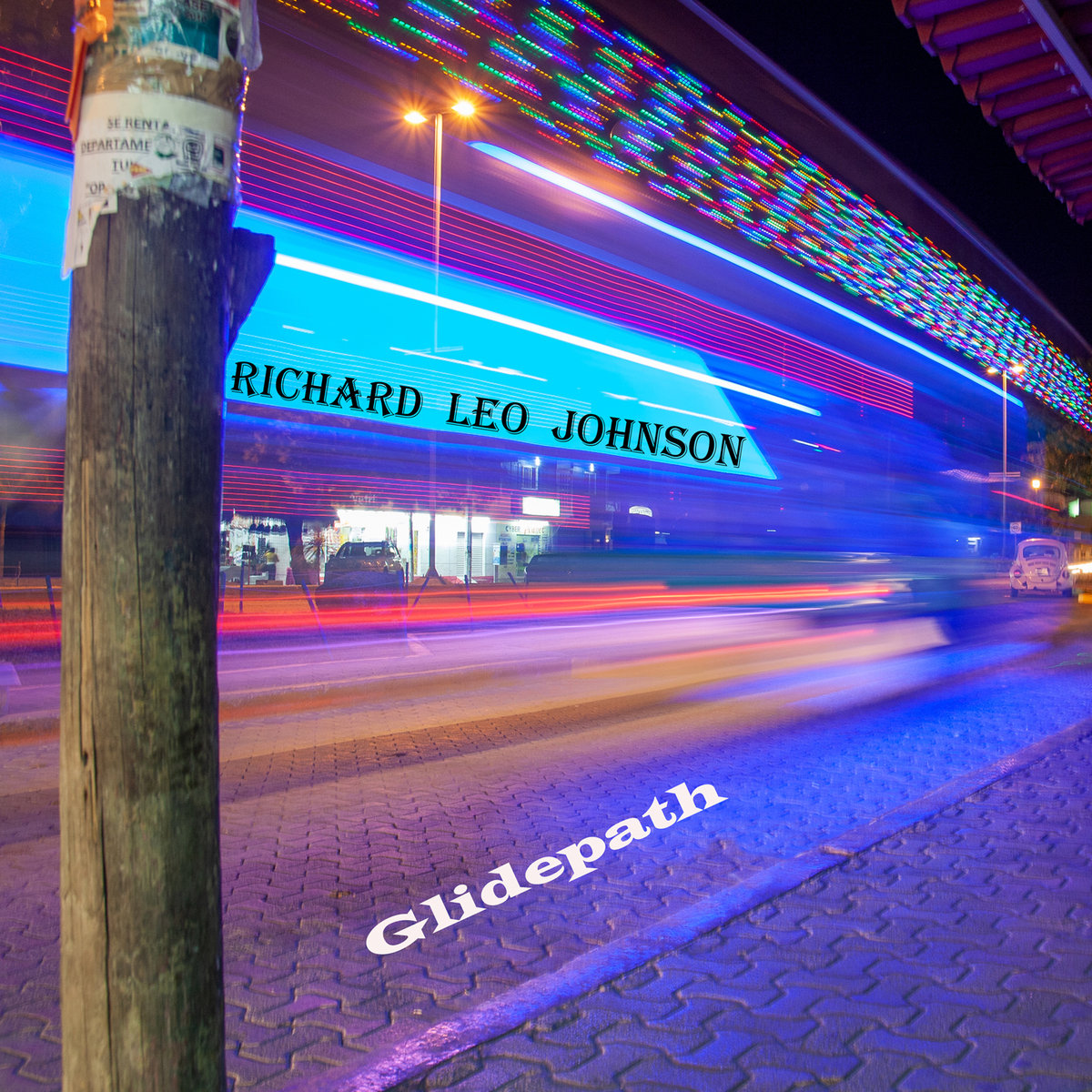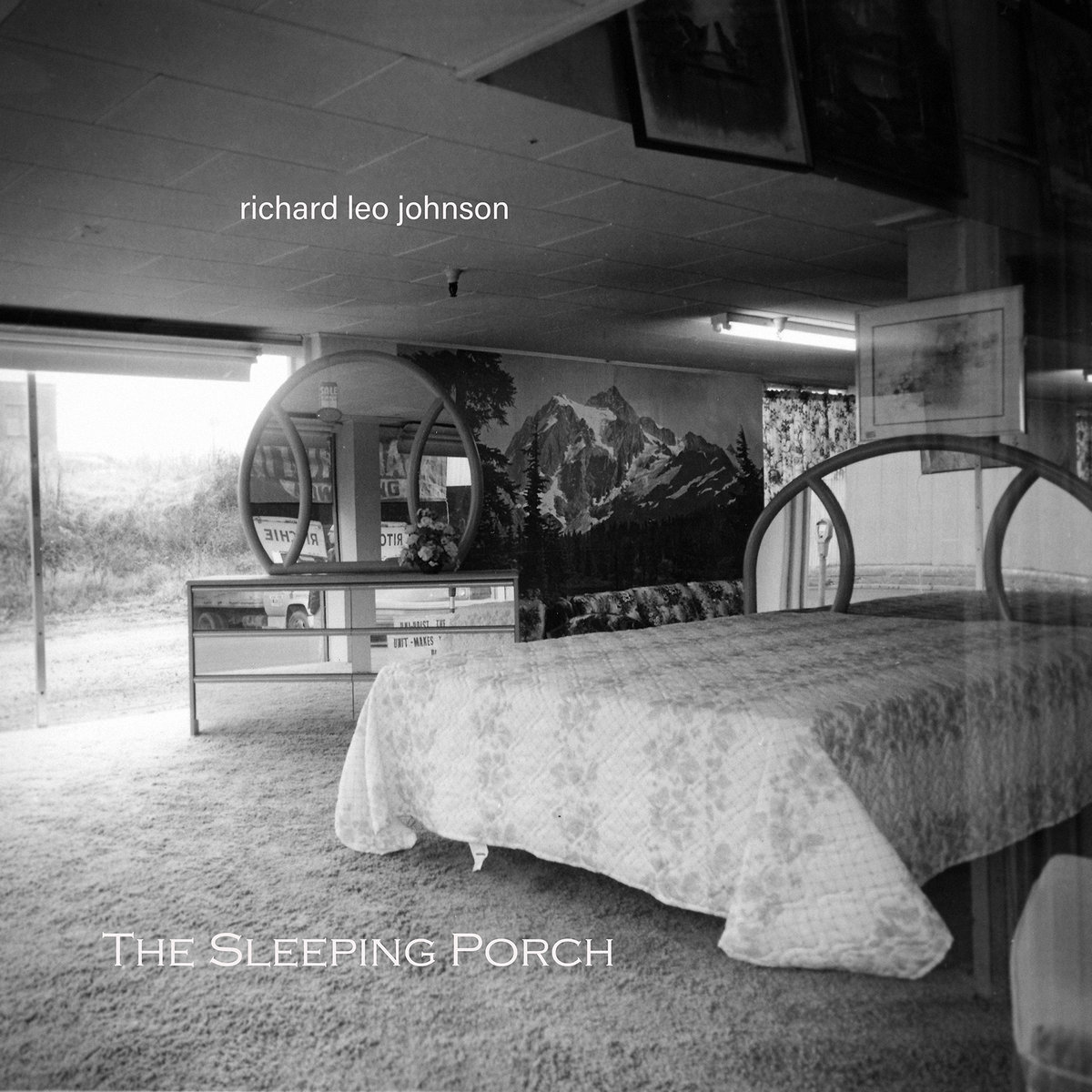Richard Leo Johnson is one of the most innovative and inspired acoustic guitarists on the current American music scene. Johnson’s style, characterized by complexity, exhilarating speed, and hauntingly unfamiliar harmonies created through ‘found’ tunings, marks this self-taught player apart. Richard was raised in America’s deep South, in a small Arkansas town in the Mississippi Delta. A good indication of what Richard is about is captured when he recalls that his “real jumping off point” was a home-made cassette he received as a teenager, which featured The Mahavishnu Orchestra’s Inner Mounting Flame on one side, and Leo Kottke’s Greenhouse on the other; “I thought both sides were by the same artist! The initial impact was that it was somehow possible to make something happen that fused the linear liquidity of McLaughlin and the dense harmonic structure and drive of Kottke.” Practicing incessantly on his own, Johnson developed an idiosyncratic playing style which combined plucking and strumming, alternating between 6, 12, and 18 strings (a 2-necked McCullum guitar with 6 and 12 strings), using all parts of the guitar, and employing 30 tunings he devised. The Richard Leo Johnson Trio is his first ever 'band' and it fuses elements of Americana, rock, ambient and folk music with the sensibilities of classical color and structure, reflecting an eclectic, modern outlook on chamber music. With the collaboration of the classically trained and former symphony musicians Andrew Ripley (wind instruments and electronics) and Ricardo A. Ochoa (strings and theremin), Richard Leo Johnson brings a fresh new focus and additional instrumental orchestrations to his own brand of guitar-centric instrumental poetry, making for a music that is both beautiful and deep.
 WHO KNEW CHARLIE SHOE? RUNE 258 |
"When you enter the surreal sonic wonderland of Who Knew Charlie Shoe – and you definitely should – prepare to be amazed, amused, exasperated and, above all, eminently entertained. The faux folkloric alternate musical universe created by the duo of guitarist Richard Leo Johnson and percussionist Gregg Bendian is nothing less than the stuff of genius. Equiped with cheap guitars and improvised percussive devices, the duo crafts a low-tech high concept album that explores the life of a fictional backwater Arkansas savant in 21 succinct and surprising tracks. A few tracks are closer to artfully arranged noise than songs, but the majority are tuneful, cheerful and melodic. A force of nature guitarist, Johnson's personalized playing is pure and unpredictable, as it provides points of reference to other guitarists, especially John Fahey in his more adventurous acoustic period – but only in passing as it relentlessly races down uncharted idiosyncratic paths all its own. If you don't hear a particular guitar style – blues, classical, jazz, folk or none of the above – give the album another listen, because Johnson plays it well at some point..." - Downbeat "Johnson is perhaps the real heir to the throne left empty when John Fahey died. His acoustic guitar playing is subtly virtuosic, and his music is informed by everything from Stravinsky to folk music to acid rock. Drummer Bendian reveals another side of his colorful, experimental nature." - John Schaefer, WNYC Richard Leo Johnson's style on the acoustic guitar is marked by emotional depth, complexity and hauntingly unfamiliar harmonies. Percussionist Gregg Bendian is the leader of The Mahavishnu Project and Interzone. They have toured together in the past, opening for King Crimson, among others, but this is their first recording together. This record is an extension of the music and story of Vernon McAlister and his music's influence on the people he encountered, which started on Richard's last record, The Legend of Vernon McAlister. As on that album, Richard has taken on a character's role in order to 'get inside' of the music. Charlie is a self-taught guitarist from Marked Tree, Arkansas who has developed his own way of playing the guitar, after a chance encounter with Vernon. "Junk Fish" was a successful drummer in the 1970s, but was eventually a casuality of the rock and roll lifestyle. He sold his drums, moved to Marked Tree and works in the salvage yard where he and Charlie met. Richard and Gregg work with "junk" percussion, cheap guitars purchased off eBay, field recordings and simple tape effects to make a kaleidoscopic, down-home, psychedelic experience. In a few spots, Gregg's non-standared percussion instruments are reminscent of the Harry Partch instruments, and the music that resembles the imaginary meeting of Harry Partch and John Fahey! Who Knew Charlie Shoe? press release |
 THE LEGEND OF VERNON McALISTER RUNE 222 |
"...an arsenal of unusual playing and production techniques...filled with strong melodies..." - All About Jazz "You can hear jazz, blues, folk and classical at times, but the lasting impression is how meaningful and heartfelt every note sounds; this is endless invention in the service of a private yet compelling beauty." - JazzTimes This CD is very low key, very personal and very extraordinary. Best known for his blazing speed and unusual techniques on the acoustic guitar, "Richard Leo Johnson has emerged from the fringe of the Mississippi Delta to become one of the baddest axe slingers in the land." - Jazziz On this album, Richard has traded in his trademark double-neck acoustic for a well-worn, 1930's National Duolian steel-bodied guitar which he stumbled across. "I pulled it out of the case and was immediately stunned by its playability and tone. Bells, horns, voices and other mysterious qualities emanated from its resonate chamber. Moments later I noticed something etched into the steel body. It was the name Vernon McAlister, apparently the one-time owner of this amazing instrument. Who was Vernon? I could find nothing about him. A myth of sorts emerged, using this wonderful instrument as the nucleus. Every sound on this recording comes directly from the Vernon guitar." Richard was inspired by this unique instrument and its sounds to try something different from any of his other albums. This is a CD of deep beauty and innovation, created with just this one old guitar and some simple electronic and tape effects. As Dean Blackwood (Revenant Records) said about it, it is located in some sort of nether place between the old and the modern. "A rustic strain of ambient Americana has been in the wind for the last year or so, with Daniel Lanois's solo pedal steel album, Belladonna, and Jeff Beal's literally haunted score to Carnavale taking American roots into ambient spaces. Richard Leo Johnson's The Legend of Vernon McAlister may have upped the ante. Johnson was already a critically acclaimed fret-burner, bringing two-handed tapping techniques to his double-necked acoustic. Here, he opts for a gentler, but possibly more avant-garde sound, trading his acoustic for a National Steel guitar. Like a Dobro on steroids, the National Steel is a metal guitar whose overtones and strange resonances make it capable of the most unearthly sounds. Creating a mythological narrative around the story of Vernon McAlister, whose name is actually etched on Johnson's ancient instrument, the guitarist creates a sound that is both mystical and rural, like the lost ghost of McAlister slipping his sound through static and haze. Johnson overdubs himself, picking and sliding notes and often using an e-bow that makes the instrument sound like a musical saw. The Legend of Vernon McAlister traverses the Appalachian fantasy of "Morning Glory," serene backwoods reveries on "Side Road to Splendor," and experimental tone poems on "Briar Patch Harmony." Richard Leo Johnson has created an album of hidden and subtle charms." – John Diliberto, Amazon.com editorial review "A truly beautiful guitar record. This gentleman was given one of those metal acoustic guitars and fell in love with it. Ostensibly, this is a "country blues" CD - he starts off in the John Fahey realm, played very well and comfortably. But by the end his playing has become so evocative that you forget you're hearing acoustic guitars (he overdubs at times). He incorporates some "avant-garde" techniques as the album goes on, but they are worked so smoothly into the sequence that they are not important in and of themselves - it's more how they make the music feel. This disc is at times achingly beautiful, at times relaxedly comfortable, and at times mysterious and otherworldy. There was a type of music that guitarists tried to get at some years ago when they worked the John Fahey/ Leo Kotke realm, but they never quite got. This is actually it (to my ears.). And it was recorded in his attic." – Roger Miller, Mission of Burma Legend of Vernon McAllister press release |
 POETRY OF APPLIANCE RUNE 198 |
The Richard Leo Johnson Trio is Johnson's first ever 'band' and it fuses elements of Americana, rock, ambient and folk music with the sensibilities of classical color and structure, reflecting an eclectic, modern outlook on chamber music. With the collaboration of the classically trained and former symphony musicians Andrew Ripley (wind instruments and electronics) and Ricardo A. Ochoa (strings and theremin), Richard Leo Johnson brings a fresh new focus and additional instrumental orchestrations to his own brand of guitar-centric instrumental poetry, making for a music that is both beautiful and deep. "Be prepared...the extraordinary Richard Leo Johnson isn't quite like any...guitarist you've ever heard before." – Jazzwise "Difficult to categorize...but marvelous to hear." – All Music Guide |
 GLIDEPATH RUNE 3341 |
"Richard Leo Johnson is a self-taught guitarist whose unorthodox acoustic style is reminiscent of the late Michael Hedges. While he is often placed in the new age camp, his sonic and rhythmic whirlwinds are often far more intense than that term implies. He claims Leo Kottke, John McLaughlin, and Pete Townshend as influences. Some will also detect strong hints of Larry Coryell, Ralph Towner, and Pat Metheny. Born and raised in Arkansas and residing in Georgia, Johnson was quite successful as an architectural photographer before becoming a musician. His debut recording, Fingertip Ship, was released in 1999 on Blue Note Records. Language, also on Blue Note, appeared in 2000..." – AllMusicGuide biography All the above is true, HOWEVER.... A decade before Blue Note, Richard was a touring guitarist and endorser of Taylor Guitars, performing at clinics and instrument shops all across the USA, and he released two, nearly unknown, cassette-only releases. This is the second of those two releases! ----- Richard Leo Johnson is one of the most innovative and inspired acoustic guitarists who emerged from the American music scene in the 90s, before the resurgence of acoustic guitar players. Johnson’s style, characterized by complexity, exhilarating speed, and hauntingly unfamiliar harmonies created through ‘found’ tunings, marks this self-taught player apart. Richard was raised in America’s deep South, in a small Arkansas town in the Mississippi Delta. A good indication of what Richard is about is captured when he recalls that his “real jumping off point” was a home-made cassette he received as a teenager, which featured The Mahavishnu Orchestra’s Inner Mounting Flame on one side, and Leo Kottke’s Greenhouse on the other; “I thought both sides were by the same artist! The initial impact was that it was somehow possible to make something happen that fused the linear liquidity of McLaughlin and the dense harmonic structure and drive of Kottke.” Practicing incessantly on his own, Johnson developed an idiosyncratic playing style which combined plucking and strumming, alternating between 6, 12, and 18 strings (a 2-necked McCullum guitar with 6 and 12 strings), using all parts of the guitar, and employing 30 tunings he devised. --------------------- TROPICAL NIGHTMARE: The reclusive poet Roy Douglas Burroughs wrote a play by the same title. He wandered the streets of my home town in South Arkansas, and occasionally sold handmade books at the local mall. Once day while moving his typewriter from an upper shelf in his room, he slipped and fell, ending his private career. |
 THE SLEEPING PORCH RUNE 3340 |
"Richard Leo Johnson is a self-taught guitarist whose unorthodox acoustic style is reminiscent of the late Michael Hedges. While he is often placed in the new age camp, his sonic and rhythmic whirlwinds are often far more intense than that term implies. He claims Leo Kottke, John McLaughlin, and Pete Townshend as influences. Some will also detect strong hints of Larry Coryell, Ralph Towner, and Pat Metheny. Born and raised in Arkansas and residing in Georgia, Johnson was quite successful as an architectural photographer before becoming a musician. His debut recording, Fingertip Ship, was released in 1999 on Blue Note Records. Language, also on Blue Note, appeared in 2000..." – AllMusicGuide biography All the above is true, HOWEVER.... A decade before Blue Note, Richard was a touring guitarist and endorser of Taylor Guitars, performing at clinics and instrument shops all across the USA, and he released two, nearly unknown, cassette-only releases. This is the first of those two releases! ----- Richard Leo Johnson is one of the most innovative and inspired acoustic guitarists who emerged from the American music scene in the 90s, before the resurgence of acoustic guitar players. Johnson’s style, characterized by complexity, exhilarating speed, and hauntingly unfamiliar harmonies created through ‘found’ tunings, marks this self-taught player apart. Richard was raised in America’s deep South, in a small Arkansas town in the Mississippi Delta. A good indication of what Richard is about is captured when he recalls that his “real jumping off point” was a home-made cassette he received as a teenager, which featured The Mahavishnu Orchestra’s Inner Mounting Flame on one side, and Leo Kottke’s Greenhouse on the other; “I thought both sides were by the same artist! The initial impact was that it was somehow possible to make something happen that fused the linear liquidity of McLaughlin and the dense harmonic structure and drive of Kottke.” Practicing incessantly on his own, Johnson developed an idiosyncratic playing style which combined plucking and strumming, alternating between 6, 12, and 18 strings (a 2-necked McCullum guitar with 6 and 12 strings), using all parts of the guitar, and employing 30 tunings he devised. |
PRESS RELEASES
Who Knew Charlie Shoe? press release
Legend of Vernon McAllister press release
Legend of Vernon McAllister press quotes
Poetry of Appliance press release
Poetry of Appliance press quotes
Miscellaneous press quotes from previous releases
Subscribe to Cuneiform's newsletter!
